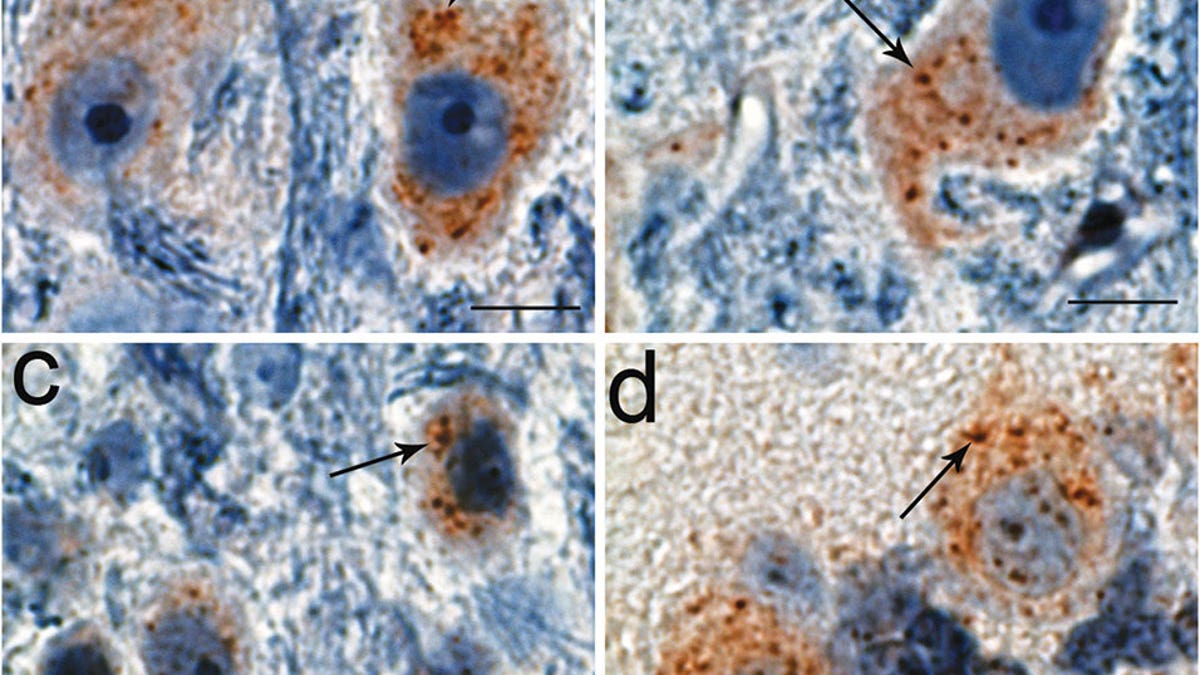
A microscopic look at the protein encoded by the TMEM230 gene. (Courtesy Northwestern University)
Researchers in Illinois have unveiled the third gene linked with Parkinson’s, a discovery that comes following the death of legendary boxer Muhammad Ali, who suffered from the neurodegenerative disease for three decades.
Scientists’ findings, published Monday in Nature Genetics, suggest the genetic mutation TMEM230 was present among Parkinson’s patients in North America and Asia, and had similar protein trafficking characteristics as the other two genetic mutations linked with Parkinson’s, according to a Northwestern University press release. They found TMEM230 produced a protein involved in the packaging of dopamine in neurons, which is significant because Parkinson’s is marked by the breakdown of dopamine-producing neurons.
The study findings may inform future treatments for the disease, as 15 percent of Parkinson’s disease cases are linked with genetics, study authors said. Genetic mutations in SNCA and LRRK2 are also thought to cause Parkinson’s.
“Previous research has associated Parkinson’s disease with various factors in the environment, but the only direct causes that are known are genetic,” principal investigator Dr. Teepu Siddique, the Les Turner ALS Foundation/Herbert C. Wenske Foundation Professor at Northwestern University Feinberg School of Medicine, said in the release. “Many genes have been claimed to cause Parkinson’s disease, but they haven’t been validated. We show that mutations in this new gene lead to pathologically and clinically proven cases of the disease.”
Study authors analyzed the genes of 65 family members— 13 with the disease and 52 without— to look for commonalities among those with Parkinson’s. They narrowed in on a DNA region on chromosome 20 that contained 141 known genes and used whole exome sequencing to identify more than 90,000 genetic variants. Among those variants was TMEM230, which appeared to be the disease-causing mutation.
“This was a totally new gene. We didn’t know its function,” study co-author Dr. Han-Xiang Deng, a neurology professor at Northwestern, said in the release. “So we did a series of studies to find out where the protein encoded by this gene is located and what it does.”
Deng and his colleagues observed that TMEM230 encodes a protein that reaches synaptic vesicles, which reside in neurons and store neurotransmitters before they are let go to circulate among cells. Current treatments for Parkinson’s disease affect dopamine released by these synaptic vesicles, which in turn impacts motor activity and mood, among other parts of the body that Parkinson’s impacts. Scientists said it’s possible the protein plays a role in the transport of these vesicles, as all three genetic mutations linked with Parkinson’s appear to possess this trafficking defect.
“Our new findings suggest that normalizing synaptic vesicle trafficking may be a strategy for future therapeutic development. We can develop drugs to promote this critical pathway,” Deng said in the release.
Researchers confirmed the presence of a genetic mutation in TMEM230 among populations of Parkinson’s disease patients in North America as well as China. They verified that the patients had overt symptoms of the disease as well as pathological markers.
“This particular gene causing Parkinson’s disease is not just limited to one population in North America,” Siddique said in the release. “It’s worldwide, found in very different ethnic and environmental conditions. These mutations are that strong.”
Next, researchers plan to study the progression of TMEM230 mutations in mouse models.




















